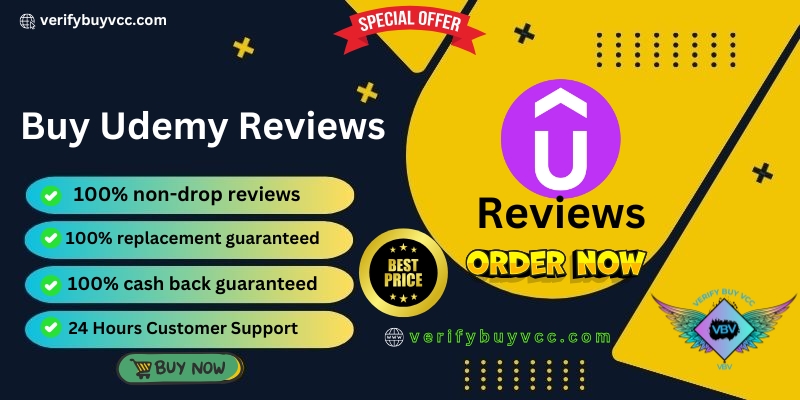Buy Udemy Reviews
Are you looking for Buy Verified Udemy Reviews for your business? We can provide you with genuine Udemy Reviews at a very reasonable price. If you are interested, about more information just knock US ➤
Buy Udemy Reviews
Online learning platforms have revolutionized education, bringing accessible, affordable courses right to your fingertips. At the forefront of this movement is Udemy, one of the most popular e-learning platforms globally. But with so many options available, how does Udemy stack up? Is it the right platform for your learning needs? This in-depth review looks at Udemy’s key features, pros, cons, and what users have to say to help you decide whether it’s worth investing your time and money.
What Is Udemy?
Udemy is a massive open online course (MOOC) platform that offers a library of over 200,000 courses on a wide range of topics, from software development and design to personal growth and hobbyist pursuits like cooking or playing guitar. Since its launch in 2010, Udemy has grown into a hub where learners can acquire new skills, network with like-minded individuals, and gain practical knowledge.
The platform operates on a marketplace model, where instructors create and upload courses, and students purchase access. Thanks to this structure, Udemy offers an incredibly diverse course catalog, catering to learners with various skill levels and interests.
Key Features of Udemy
Before we dive into user reviews and experiences, let’s take a look at some of the standout features that Udemy brings to the table.
1. Wide Variety of Courses
Udemy’s biggest selling point is its sheer range of courses. Whether you’re looking to learn coding, digital marketing, yoga, or even SAT prep, Udemy likely has a course for you. The platform serves as a one-stop shop for learners of all types, from hobbyists to career-focused professionals.
2. Affordable Pricing
Unlike many subscription-based platforms, Udemy allows you to purchase individual courses without committing to a recurring fee. Courses can cost anywhere from $10 to $200, but regular discounts mean you can usually snag courses for as little as $10–$20.
3. Lifetime Access
One of the most compelling aspects of Udemy is that once you purchase a course, you gain lifetime access. That means you can revisit the content whenever you need, which is especially useful for skill-based learning that requires continuous practice.
4. User-Friendly Interface
Udemy’s platform is straightforward and user-friendly, making it easy to search for courses, enroll, and track your progress. Features like video playback speed adjustment and downloadable resources enhance the learning experience.
5. Instructor-Led Content
Courses are created and delivered by instructors, many of whom are industry professionals with firsthand experience in their fields. While this ensures variety, the quality of courses can vary, as instructors operate independently.
6. Certificates of Completion
Upon completing a course, you’ll receive a certificate of completion. While these certificates aren’t accredited by universities, they can serve as a great way to showcase new skills on platforms like LinkedIn or in job applications.
The Pros of Udemy
Why do millions of learners choose Udemy? Here are some of the platform’s notable advantages:
1. Diverse Course Topics
From mainstream professional skills like coding, management, or business to niche areas like watercolor painting or knitting, Udemy’s library is unmatched in its variety.
2. Flexibility
Udemy courses are self-paced. This is perfect for learners who need to balance continued education with work, family, or other commitments.
3. Frequent Discounts
Udemy regularly offers discounts on its courses, dropping prices significantly. This makes education accessible to those on a tight budget.
4. Beginner-Friendly
Many courses are tailored to beginners, complete with step-by-step breakdowns of fundamental concepts.
5. Access Anywhere
Udemy’s mobile app allows you to learn on the go, providing offline access to your purchased courses.

The Cons of Udemy
Despite its strengths, Udemy isn’t without drawbacks. These are points to consider before purchasing a course:
1. Varying Quality
Because the platform relies on independent instructors, the quality of courses can be hit-or-miss. Some courses are expertly produced, while others may lack polish or depth.
2. No Accreditation
Unlike platforms like Coursera, which partner with universities to offer accredited certifications, Udemy courses are not officially recognized.
3. Limited Depth in Advanced Topics
While Udemy shines in beginner and intermediate-level courses, truly advanced professionals might find the platform lacking in depth for certain subjects.
4. Upselling
Some courses may push additional purchases, such as premium features or follow-up courses, which can feel overwhelming.
Users’ Opinion on Udemy
What do actual users have to say about Udemy? Here’s a roundup of some of the most common responses:
Positive Reviews
- Affordable learning: Many users praise Udemy’s affordability, especially during its frequent sales, which allow access to high-quality content for as low as $10.
- Convenience: Learners love Udemy’s flexibility, enabling them to learn at their own pace and schedule.
- Lifetime access: Users value the ability to revisit course content whenever they need, which is rare among online learning platforms.
Constructive Criticism
- Course quality varies: Some users have expressed disappointment in courses where instructors were inexperienced or unclear.
- Not ideal for advanced learners: Professionals looking for more intensive, accredited courses often recommend other platforms over Udemy.
Recommendations for First-Time Users
If you’re considering using Udemy, here are some tips to maximize your experience:
- Read Course Reviews: Before purchasing, check reviews and ratings from past learners to gauge the course’s quality.
- Explore Free Previews: Many courses offer a preview of their content so you can see if you like the instructor’s teaching style.
- Leverage Discounts: Wait for Udemy’s frequent sales to get great courses at bargain prices.
- Utilize Resources: Many courses come with downloadable texts, exercises, and other resources that can deepen your learning experience.
Is Udemy Worth It?
Udemy offers immense value for learners who are looking for flexibility and affordability. While it may not have the rigor or accreditation of academic institutions, it’s an excellent tool for acquiring practical skills, exploring hobbies, and staying competitive in your career. For those with professional learning goals, it’s particularly effective for gaining foundational and intermediate knowledge in a wide array of fields.
Final Thought: A World of Learning Opportunities Awaits
Whether you’re looking to master coding, brush up on marketing strategies, or indulge in a personal passion, Udemy provides the tools, resources, and flexibility to help you achieve your goals. But like any platform, its effectiveness depends on the quality of the courses you choose and your commitment to learning.
With thoughtful planning and wise course selection, Udemy can be a valuable addition to your lifelong learning toolkit. Take your time browsing its extensive library—who knows what skill you’ll master next?
Alternatives to Udemy
While Udemy is a popular choice for online learning, several other platforms offer unique features and benefits that may align better with certain learners’ needs. Below are some top alternatives to consider:
1. Coursera
Coursera partners with leading universities and companies to provide courses, degrees, and certifications. Its academic credibility and access to accredited programs make it an excellent option for those seeking formal qualifications.
2. edX
Similar to Coursera, edX offers courses designed by top universities and organizations. With options ranging from free courses to full-fledged degree programs, edX is a versatile platform for both personal and professional growth.
3. LinkedIn Learning
Previously known as Lynda.com, LinkedIn Learning focuses on career development. It features a library of professional skill-building courses, with added benefits like integration with LinkedIn profiles to highlight certifications for recruiters.
4. Skillshare
Skillshare is ideal for creatives and entrepreneurs, providing project-based learning in areas like design, marketing, photography, and more. Unlike Udemy, it operates on a subscription model, granting access to a broad range of content for a single fee.
5. Khan Academy
A nonprofit platform, Khan Academy is perfect for foundational learning, especially for students in school or those brushing up on basic subjects like math, physics, or history. Its offerings are free and accessible for learners of all ages.
Each platform brings a different flavor to online education, so it’s worth exploring these to see which suits your learning objectives best.
6. Pluralsight
Pluralsight is a go-to platform for technology professionals looking to upskill. Its courses cover topics like software development, IT operations, data science, and cybersecurity. With skill assessments and guided learning paths, Pluralsight is particularly effective for those pursuing technical expertise.
7. MasterClass
MasterClass stands out for its celebrity-led courses in areas like writing, music, cooking, and leadership. While it leans more toward inspiration and creativity rather than academic depth, it’s an exceptional platform for those seeking mentorship-like insights from industry experts.
8. Codecademy
Focused on coding and programming, Codecademy offers interactive, hands-on lessons to build real-world skills. The platform’s structure is tailored to beginners and intermediate learners, making it a solid choice for anyone stepping into the tech industry.
9. FutureLearn
FutureLearn provides a blend of short courses, micro-credentials, and degree programs in collaboration with universities and institutions worldwide. It excels in offering a social learning experience, where participants can engage in discussions with fellow learners.
10. Treehouse
Similar to Codecademy, Treehouse is geared toward budding developers and designers. It delivers coding tutorials, workshops, and projects for building a strong foundation in web development, app development, and UI/UX design.
Final Considerations
Choosing the right online learning platform depends on your goals, learning style, and budget. Platforms like Udemy and Skillshare excel in affordability and diversity of topics, while Coursera and edX deliver academic credentials and advanced programs. Creative individuals might gravitate toward Skillshare or MasterClass, whereas tech professionals can benefit tremendously from Pluralsight, Codecademy, or Treehouse. Take the time to explore trial options and free courses to find the platform that resonates best with your personal and professional aspirations.
How to Choose the Right Platform for You
With so many online learning platforms available, identifying the one that caters best to your needs can feel overwhelming. Below are some key considerations to guide your decision-making process:
- Define Your Goals: Start by clarifying your learning objectives. Are you looking to advance your career, gain formal certifications, or simply explore a new hobby? Platforms like Coursera or edX are great for academic and career-focused goals, while Skillshare and MasterClass shine for creative pursuits.
- Consider Your Budget: Platforms operate on different pricing models, from subscription-based options like Skillshare and MasterClass to pay-per-course models such as Udemy. Decide on a budget beforehand and assess the value offered by each platform.
- Evaluate Course Quality: Look for platforms that provide detailed reviews and ratings from other learners. Preview course materials, if possible, and ensure they align with your expectations in terms of depth and delivery style.
- Check for Accreditation: If certifications or credentials are important to you, focus on platforms like Coursera, edX, or FutureLearn that partner with universities and offer accredited programs.
- Explore Free Trials or Courses: Many platforms offer free trials or a selection of free courses. Taking advantage of these can provide a hands-on experience with the platform and help you determine if it meets your needs.
- Assess the Teaching Style: Different platforms cater to different learning preferences. For hands-on learners, interactive platforms such as Codecademy or Treehouse might be ideal. If you prefer structured, lecture-style courses, Coursera or LinkedIn Learning could be a better fit.
- Factor in Flexibility: Determine how much time you’re willing to dedicate to learning. Platforms like Udemy or Skillshare allow for on-demand, self-paced learning, while others such as Coursera or edX may require a greater time commitment for scheduled programs.
By carefully evaluating these factors, you’ll be well-prepared to select the platform that can best help you achieve your learning goals efficiently and effectively. Online learning is more accessible than ever, offering everyone the opportunity to grow and succeed in their chosen fields.






There are no reviews yet.